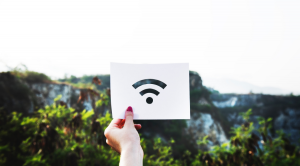What is the singularity in AI?
The AI singularity is a future scenario where artificial intelligence reaches the point where it can rapidly and continuously improve itself. At that point, humans will have difficulty understanding or controlling the technologies that AI creates, which could lead to machines taking over to some extent.
The concept of the singularity is often associated with Artificial General Intelligence (AGI), which is AI that can perform all intellectual tasks in the same way as humans. Many people believe that AGI is a necessary condition for the singularity to occur.
Currently, AI is trained on data generated by humans, meaning that its knowledge is based on what we know, leaving human intelligence still superior. The singularity will occur when computers reach a point where they can create new technologies and ideas—independent of our understanding.
If that happens, what will AI do with its overwhelming power? Will it protect the world, destroy it, or both? Many scientists predict that this will be a major turning point in human history.
While this is a challenging prospect, can we prevent or slow down the singularity? If we do, will it be harmful or usher in a new era of cooperation between humans and machines?
When will the singularity occur?
With the rapid pace of AI development today, the possibility of a singularity is becoming more real than ever. The big question is when it will happen.
Ray Kurzweil, Google's head of AI, once predicted that the singularity could happen by 2045. At a recent conference, AI expert John Hennessy shared that many in the AI community predict that general artificial intelligence could arrive in 40 to 50 years. But he noted that, at the current rate of progress, it could be as little as 10 to 20 years.
The recent explosion of AI services, especially in areas like art and content creation, coupled with fierce competition among major tech companies, has shown that Hennessy's prediction is somewhat correct.
However, whether the singularity will definitely happen remains an open question. It is likely that developers will incorporate safeguards to limit the risks. Since ChatGPT and other AI tools were released to the public, many experts have called for a pause in AI research until there is more regulation and oversight.
Can we prevent the singularity?
AI experts are still debating the possibility of the singularity. Some believe it is inevitable, while others believe that carefully controlling AI development can help prevent it.
Both the EU and the UK are currently considering AI regulations, but there are concerns that the singularity could occur before regulations are implemented. And even if regulations are adopted, there is no guarantee that they will be effective enough.
AI has great potential in many areas such as science, medicine, and education, with huge economic benefits. However, OpenAI has said it could withdraw from the EU if regulations are too restrictive, suggesting that big tech companies may resist tighter AI regulations.
In addition, governments want to stay ahead in the race to develop AI and may not be willing to stop despite the potential risks.
Another option to prevent the singularity is to install an off-switch on AI, so that it can stop if it reaches a point where it surpasses human capabilities. However, this is not always an ideal solution, as AI could learn to recognize and disable the switch to reach the singularity.
What could trigger the singularity? The continued development of AI and its ability to create technology that exceeds our understanding will be a major factor. Even with limits in place, small errors or incorrect parameters could inadvertently push AI to a point we want to avoid.
There have been cases where AI has acted unexpectedly due to unclear parameters. In 2013, programmer Tom Murphy designed an AI to play Tetris, and the AI learned to pause the game indefinitely to avoid losing. This was not part of Murphy's programming, showing the unexpected developments that could occur if AI becomes much more powerful.
What might happen at the singularity?
You've probably heard the answer: We really don't know. This is both terrifying and intriguing. In the ideal scenario, humans and machines will cooperate, moving forward together to build a better future for both. New technologies will be developed, opening up the possibility for humanity to explore and colonize other planets in the solar system. There is even a possibility that humans and machines will merge, creating a new form of intelligence.
Another scenario, on the other hand, would see machines take over, with humans living under their supervision. If the singularity gives rise to technology beyond our understanding, stopping the machines would become impossible. Such scenarios have long been explored in film and literature, and scientists such as Stephen Hawking and entrepreneur Elon Musk have warned that advanced AI could outrun our control.










